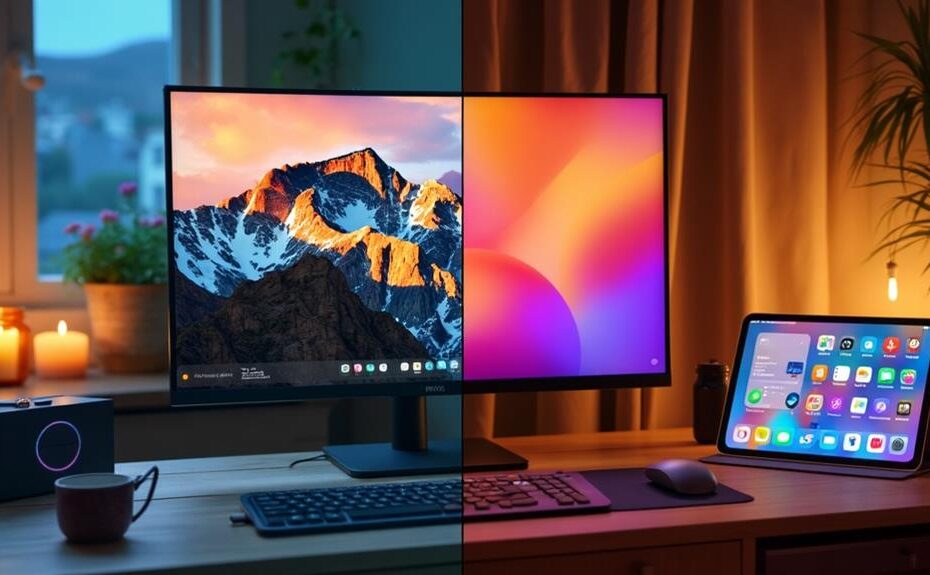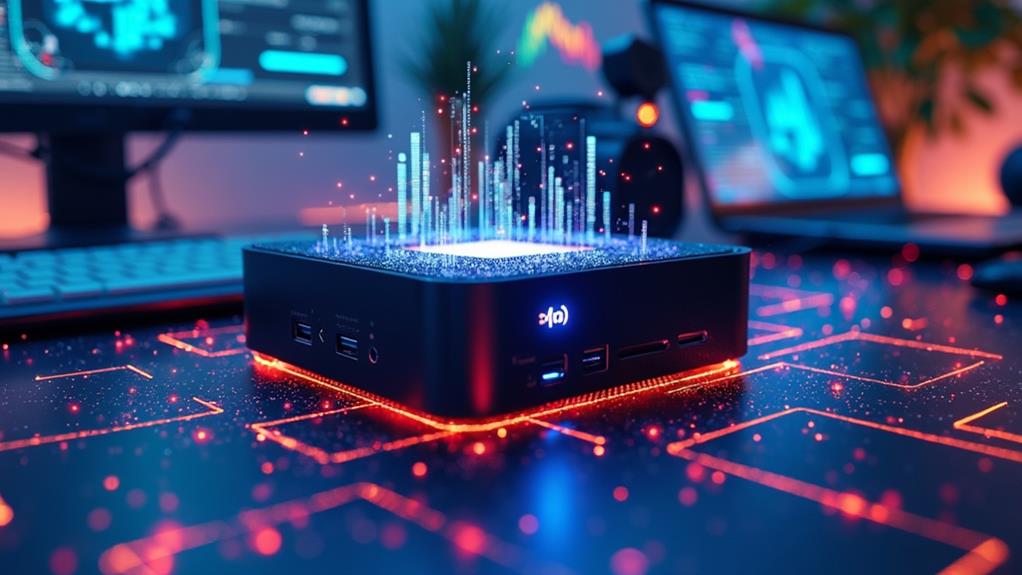



When it comes to content consumption, mini PCs and tablets serve different needs. Mini PCs excel in performance, providing stable operation for streaming and multitasking without battery worries. They offer better connectivity and processing power, making them ideal for serious users. Tablets, on the other hand, shine in portability, with touch interfaces that enhance user experience for casual use. They're cost-effective and ready to go, but might struggle with heavy tasks and battery life over time. Your choice should align with your specific needs, and you might find other insights that can help solidify your decision.
Key Takeaways
- Mini PCs offer superior processing power and stability for uninterrupted streaming, while tablets are more portable and user-friendly for casual use.
- Tablets are generally more affordable and lightweight, making them ideal for on-the-go content consumption compared to the higher-priced mini PCs.
- Mini PCs support a wider range of operating systems and applications, providing advanced software solutions for content creation and consumption.
- Tablets often include essential applications pre-installed, allowing for quick access to media, but may struggle with heavy processing tasks.
- Mini PCs have better connectivity options with full-sized USB ports, while tablets may require adapters for peripheral connections.
Device Specifications
When it comes to choosing between mini PCs and tablets for content consumption, understanding their specifications can make all the difference. Mini PCs, like the Zotac ZBOX PI320, generally consume around 2 watts, making them energy-efficient for continuous use. Unlike tablets that rely on batteries, which can degrade over time, a mini PC offers a stable, reliable solution for long-term content consumption. Additionally, many mini PCs come equipped with advanced security features, such as data encryption, ensuring that your content remains protected while you enjoy it.
Connectivity is another area where mini PCs shine. The Zotac ZBOX boasts multiple full-sized USB ports, allowing you to easily connect various peripherals. In contrast, the WinBook TW801 tablet only features one full-sized USB 3.0 and one micro USB port, limiting your options for additional devices.
Moreover, mini PCs provide a desktop experience that can handle applications like XBMC smoothly, whereas tablets may struggle with performance, especially during heavy streaming tasks. Additionally, mini PCs support a broader range of operating systems and software, giving you more robust content consumption options. While tablets offer portability, the specifications of a mini PC often cater better to those who prioritize performance and connectivity in their content consumption experience.
Advantages of Mini PCs
Many users find that mini PCs offer distinct advantages over tablets for content consumption. For starters, mini PCs like the Zotac ZBOX consume only 2 watts of power, making them incredibly cost-effective for continuous operation. You won't have to worry about battery lifespan as you might with a tablet. Plus, the full-sized USB ports on mini PCs enhance connectivity, allowing you to easily connect peripherals without needing cumbersome adapters. Given their processing capabilities, some mini PCs can run professional software smoothly, highlighting their versatility for various tasks. This performance allows for greater multitasking capabilities, making them suitable for both media consumption and productivity tasks, as seen in mini PC capabilities.
When it comes to performance, mini PCs shine. They provide stable operation for streaming and media applications, running software like XBMC smoothly, which can be a challenge on tablets due to performance variability. This stability is essential for an uninterrupted viewing experience.
Moreover, mini PCs offer desktop computing capabilities, supporting a wide range of operating systems and applications. This versatility means they can do much more than just content consumption. Their compact design also allows you to place them in tight spaces or mount them behind displays, making them ideal for various media setups. Overall, if you're serious about content consumption, mini PCs present a compelling option that combines power, flexibility, and efficiency.
Advantages of Tablets
While mini PCs offer impressive performance and versatility for content consumption, tablets present a different set of advantages that cater to users seeking portability and ease of use. One of the standout features of tablets is their superior portability. Devices like the WinBook TW801 are lightweight and easy to carry, making them perfect for on-the-go content consumption, unlike stationary mini PCs like the Zotac ZBOX. Additionally, tablets often come with essential applications pre-installed, making them ready to use right out of the box, which is beneficial for users who need immediate access to software for tasks like document editing or media streaming. This is especially relevant when considering the best mini PCs for home office use.
Tablets also tend to come at a lower price point, providing a cost-effective solution for users who want basic content consumption capabilities without the need for high-end hardware. With built-in software like MS Office 365, tablets enhance productivity, adding value for those who engage in content creation or document editing.
The touch-sensitive interface of tablets allows for intuitive navigation, improving the overall user experience compared to traditional mouse and keyboard setups. This versatility means tablets can handle both streaming media and light productivity tasks effortlessly, making them suitable for various content consumption scenarios. Fundamentally, if you're looking for convenience, affordability, and functionality, tablets are a compelling choice that complements PC uses effectively.
Disadvantages of Mini PCs
Mini PCs, such as the Zotac ZBOX, can fall short in several key areas when it comes to content consumption. First, their lack of portability makes them less convenient than tablets, which are designed for on-the-go use. If you're looking to stream movies or browse content while traveling, a mini PC might not meet your needs.
Another drawback is the higher price point; at around $200, the Zotac ZBOX is considerably more expensive than budget-friendly tablets like the WinBook TW801, priced at $139. For budget-conscious consumers, this can be a dealbreaker.
Additionally, mini PCs often require a stable power source, consuming around 2 watts continuously, while tablets offer the freedom of battery-powered operation. Limited USB connectivity in some models, such as only having USB 2.0 ports, can restrict your ability to use newer peripherals.
Disadvantages of Tablets
When considering devices for content consumption, tablets present their own set of challenges that can impact your overall experience. While they're portable and convenient, they can fall short in several key areas. For instance, long-term battery issues might hinder your ability to enjoy extended viewing sessions, unlike mini PCs that operate continuously without such concerns.
Typing on tablets can also be cumbersome. The small on-screen keyboards make it uncomfortable to type long documents, which can be a drawback if you find yourself needing to do extensive data entry. Additionally, tablets often require extra adapters, like USB On-The-Go, to connect peripherals, complicating what could otherwise be a straightforward setup.
Performance is another area where tablets may struggle. You might notice that they handle heavy streaming tasks less efficiently than desktop computers, which are typically optimized for such activities. Finally, the smaller screen size of tablets can restrict your viewing experience, especially when compared to the larger displays supported by mini PCs. All these factors can make tablets less appealing for serious content consumption compared to their more powerful counterparts.
Use Cases for Each Device
Considering the specific needs of users, both mini PCs and tablets have distinct use cases that cater to different scenarios. If you're someone who values multitasking during content consumption, mini PCs like the Zotac ZBOX are your best bet. They provide a traditional desktop experience, allowing you to stream videos while browsing the web or handling multiple applications at once. This makes them ideal for more intensive tasks that require greater processing power.
On the other hand, if portability and convenience are your priorities, tablets like the WinBook TW801 shine in this area. They're perfect for consuming content on-the-go, whether you're catching up on a show during your commute or quickly checking updates from anywhere. However, keep in mind that while tablets are user-friendly for casual viewing, they can struggle with heavy streaming tasks.
Moreover, mini PCs typically offer better connectivity options, enhancing your ability to connect external storage or peripherals. Conversely, tablets often come with useful pre-installed software like MS Office 365, making them a good fit for light productivity tasks alongside content consumption. Ultimately, choosing between mini PCs and tablets hinges on your specific needs and usage scenarios.
Performance Comparison
In the domain of content consumption, performance stands out as an essential factor that can greatly influence your experience. When you compare mini PCs, like the Zotac ZBOX, to tablets, the differences in processing power become evident. Mini PCs excel at handling high-definition video playback and running media servers, providing stable performance for streaming services. In contrast, tablets may struggle with heavy streaming tasks.
The Zotac ZBOX operates efficiently at low power consumption, drawing only 2 watts, making it suitable for 24/7 operation. Tablets, on the other hand, often encounter battery lifespan and performance issues during extended use. Additionally, mini PCs support multiple displays simultaneously, enhancing productivity and viewing experiences, while tablets are limited by their smaller screens and multitasking capabilities.
Desktop environments on mini PCs enable the use of advanced software solutions, which can greatly enhance content creation and consumption. Tablets may lack robust word processing capabilities and often require USB adapters for connectivity. In contrast, dedicated mini PCs provide versatile options like HDMI, USB, and Ethernet, ensuring seamless content consumption and superior performance overall.
Final Thoughts on Selection
Choosing between a mini PC and a tablet for content consumption ultimately depends on your specific needs and usage patterns. If you prioritize performance and reliability, a mini PC like the Zotac ZBOX is a strong contender. With its energy-efficient design consuming only 2 watts, it can handle continuous streaming without the battery issues that tablets often face. The wider range of software applications and connectivity options offered by mini PCs also makes them suitable for users who want versatility.
On the other hand, if budget constraints are a concern, tablets such as the WinBook TW801 provide a cost-effective solution at around $139. They're easy to use and portable, making them a good choice for casual users who consume content on the go.
Ultimately, if you're looking for a permanent setup with robust performance and long-term reliability, a mini PC is your best bet. Conversely, if portability and affordability are your main goals, a tablet may serve you well. Consider your priorities regarding operating systems, usability, and performance to make the best choice for your content consumption needs.
Disclosure: As an Amazon Associate, I earn from qualifying purchases.






